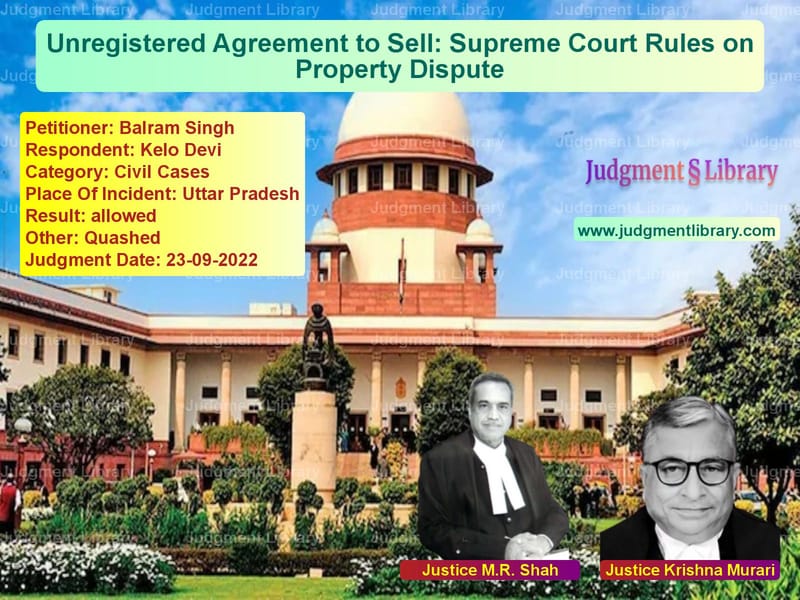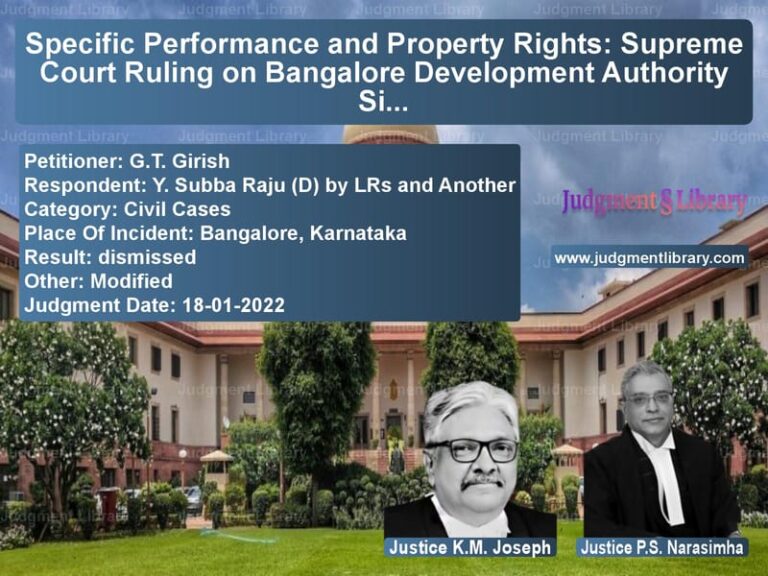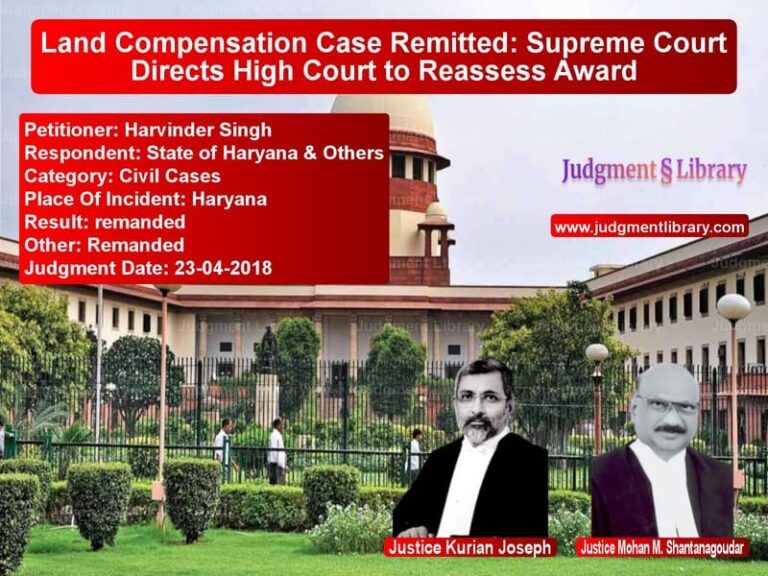Unregistered Agreement to Sell: Supreme Court Rules on Property Dispute
The legal dispute between Balram Singh and Kelo Devi revolved around the enforceability of an unregistered agreement to sell and whether it could be used as a basis for seeking a permanent injunction. The Supreme Court had to decide whether such an agreement, not registered under law, could serve as valid evidence in property-related litigation.
Background of the Case
The case originated when the respondent, Kelo Devi (original plaintiff), filed a suit in 1997 before the trial court, seeking a permanent injunction against Balram Singh (original defendant). Her claim was based on an unregistered agreement to sell, dated March 23, 1996, through which she asserted her possession of the disputed property. She sought to prevent the defendant from interfering with her possession.
The defendant, Balram Singh, filed a counter-claim, asserting that the plaintiff was in unauthorized possession of the suit property and sought a decree for possession.
Trial Court Decision
The trial court dismissed the plaintiff’s suit and ruled in favor of the defendant, allowing the counter-claim. The court found that:
- The agreement to sell was unregistered and could not be admissible as evidence.
- The plaintiff failed to prove that the agreement to sell was executed for valid consideration.
- The plaintiff had been in unauthorized possession of the property since July 8, 1997.
Appeal Before the First Appellate Court
Aggrieved by the trial court’s decision, the plaintiff approached the first appellate court, which overturned the trial court’s ruling and granted her a decree of permanent injunction. It held that the agreement to sell could be considered for collateral purposes, thus supporting the plaintiff’s claim for injunction.
Read also: https://judgmentlibrary.com/adoption-dispute-and-property-rights-a-landmark-judgment/
High Court Proceedings
The defendant then filed a second appeal before the High Court of Allahabad, which upheld the first appellate court’s ruling. The High Court affirmed that the unregistered agreement to sell could be used for collateral purposes, allowing the plaintiff to seek a permanent injunction.
Petitioner’s Arguments
The appellant, Balram Singh, challenged the High Court’s judgment before the Supreme Court, arguing that:
- An unregistered agreement to sell cannot be used as evidence to claim ownership or possession.
- The plaintiff deliberately filed a suit for permanent injunction instead of seeking specific performance, knowing that the latter claim would be dismissed due to the agreement’s lack of registration.
- Since the plaintiff could not seek specific performance, she should not be allowed to use the same agreement to obtain an injunction.
Respondent’s Arguments
The respondent, Kelo Devi, defended the High Court’s ruling, stating:
- Even if an agreement to sell is unregistered, it can still be used for collateral purposes, such as establishing possession.
- The lower courts correctly granted the injunction, as the defendant failed to prove legal grounds for disturbing her possession.
- The plaintiff’s possession should be protected under law, even if the primary transaction was unregistered.
Supreme Court’s Analysis
The Supreme Court, led by Justice M.R. Shah and Justice Krishna Murari, analyzed the issue of whether an unregistered agreement to sell could form the basis of a permanent injunction. The Court made the following key observations:
Read also: https://judgmentlibrary.com/supreme-court-rules-on-anchorage-and-port-dues-in-mumbai-port-dispute/
- “As such, such an unregistered document/agreement to sell shall not be admissible in evidence.”
- “The plaintiff cannot get the relief indirectly which otherwise he/she cannot get in a suit for substantive relief, namely, in the present case the relief for specific performance.”
- “The plaintiff cleverly prayed for a relief of permanent injunction only and did not seek the substantive relief of specific performance.”
The Court emphasized that procedural tactics cannot be used to circumvent the substantive law. It ruled that allowing a permanent injunction based on an unregistered document would set a dangerous precedent.
Supreme Court’s Ruling
The Supreme Court ruled in favor of the appellant, Balram Singh, and held that:
- The High Court and first appellate court erred in granting an injunction based on an unregistered agreement to sell.
- The plaintiff’s suit for injunction was dismissed as it was based on an inadmissible document.
- The counter-claim of the defendant was allowed, restoring the trial court’s decision.
Conclusion
The Supreme Court’s decision clarifies the legal position regarding the use of unregistered agreements to sell. While such agreements may be used for certain collateral purposes, they cannot be the sole basis for seeking substantive reliefs such as injunctions or ownership claims. The ruling reinforces the necessity of proper legal documentation in property transactions and prevents misuse of procedural strategies to claim relief that would otherwise be legally untenable.
Petitioner Name: Balram Singh.Respondent Name: Kelo Devi.Judgment By: Justice M.R. Shah, Justice Krishna Murari.Place Of Incident: Uttar Pradesh.Judgment Date: 23-09-2022.
Don’t miss out on the full details! Download the complete judgment in PDF format below and gain valuable insights instantly!
Download Judgment: balram-singh-vs-kelo-devi-supreme-court-of-india-judgment-dated-23-09-2022.pdf
Directly Download Judgment: Directly download this Judgment
See all petitions in Property Disputes
See all petitions in Specific Performance
See all petitions in Judgment by Mukeshkumar Rasikbhai Shah
See all petitions in Judgment by Krishna Murari
See all petitions in allowed
See all petitions in Quashed
See all petitions in supreme court of India judgments September 2022
See all petitions in 2022 judgments
See all posts in Civil Cases Category
See all allowed petitions in Civil Cases Category
See all Dismissed petitions in Civil Cases Category
See all partially allowed petitions in Civil Cases Category







